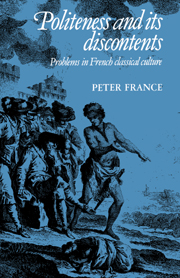Summary
Heroes may be regarded as hyperbolic; so, even more obviously, are giants and ogres. It is not possible to tell how widely or completely anyone in seventeenth-century France believed in the existence, past or present, of such monstrous beings. Travellers’ descriptions of the inhabitants of distant lands may have encouraged such beliefs, and there were plenty of respected written records of giants of former days. Alongside the long-lived patriarchs, the Old Testament told of ‘largelimbed Og’ (in Milton's phrase) and of the great Goliath, ‘whose height was six cubits and a span’. More monstrous was Homer's Cyclops, and it is worth having a look at the lines devoted to him by Bouhours in La Manière de bien penser.
The passage concerns not so much the probability of the existence of such a being as the way Homer leads the listener or reader to accept it. Bouhours is highly critical of a really extravagant writer ‘qui en parlant de la roche que le Cyclope lança contre le navire d'Ulysse, disait que les chèvres y paissaient’ (p. 359). This strains credulity. By contrast Homer makes it relatively easy for us to go along with his improbable fiction:
Il ne dit pas tout d'un coup que Polyphème arracha le sommet d'une montagne: cela aurait paru peu digne de foi. […]
- Type
- Chapter
- Information
- Politeness and its DiscontentsProblems in French Classical Culture, pp. 27 - 39Publisher: Cambridge University PressPrint publication year: 1992



